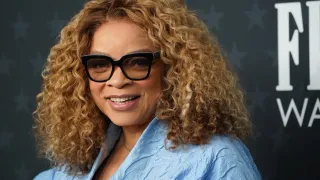October 22, 2018
Dear Evan Hansen
Kevin Taft READ TIME: 4 MIN.
You will find this decade's most earnest musical at LA's Ahmanson theatre this fall, and while that might seem like a back-handed compliment... well, it is.
Don't get me wrong, "Dear Evan Hansen" is a wonderfully composed and expertly staged musical for millennials that has certainly struck a chord both musically and thematically. Most of it works, too, except when that earnestness snakes its way into the narrative and threatens to undo it with some eye-rolling teen angst. That's not to say the feelings and emotions on stage aren't valid or real, I think it's more so that some aspects don't get fully explored which makes a few characters seem preachy and self-important.
The book of "Dear Evan Hansen" is by Steven Levenson and concerns the twitchy teenager of the title (Ben Levi Ross) who is socially awkward, nervous around other people, and prefers to spend much of his time alone because of his anxiety. He takes medication, but his social awkwardness still makes him a target at school for teasing – when he's not being ignored.
His therapist has tasked him to write letters to himself about what a great day he'll have – a way to use positive thinking to overcome his nervousness. However one of those letters finds its way into the hands of Connor Murphy (Marrick Smith), a gloomy, angry teen who kills himself soon after a confrontation with Evan. When the letter is discovered with the body, it appears as if Connor has written a heartfelt letter to Evan even though they've barely interacted. This confuses Connor's parents (Aaron Lazar and Christiane Noll) and sister Zoe (Maggie McKenna), who also happens to be the object of Evan's affections.
Being the awkward guy he is, Evan ends up lying about the letter and one lie begets another and soon enough he has Connor's family - and the school – convinced he and Connor were secret best friends and that he has an entire private email account with heartfelt emails they've exchanged over the past year.
Suddenly, Evan is the talk of the school and Connor is "popular." This is most clearly illustrated in the character of Alana (Phoebe Koyabe) who claims to be Connor's best "acquaintance" and wants everyone to open up a dialogue with her about their favorite memories of Connor, even though Connor was a loner and didn't interact with anyone. Things keep spiraling further and further with the help of Evan's annoying family friend Jared (Jared Goldsmith) who helps him write the fake letters they keep showing to the family. Soon there is a "Connor Project" that aims to refurbish an apple orchard (supposedly Connor's favorite place) and somewhere he and Evan allegedly spent a lot of time.
Except none of it is true. And eventually, all of this will catch up to Evan just as he is finally feeling like he has a life and a purpose.
The best part of the Tony-Award winning musical is the music by Benj Pasek and Justin Paul ("La La Land," "The Greatest Showman.") The team write nifty, clever, and catchy songs and know how to tug at the ole' heartstrings. To be fair, two of the best songs are in the first act ("Waving Through a Window" and "For Forever") so they kind of fire their confetti canon a bit early, but Evan's mom Heidi (Jessica Phillips) has a lovely ballad toward the end of Act II ("So Big/So Small") that had the audience in tears.
The other great thing is the lead performance. Ben Platt made a name for himself originating the role, but Ross really shines here as the nervous, uncomfortable Evan. His voice is a powerhouse and he makes the fidgety and oftentimes hilarious role his own. The two moms stand out as well.
While there is a lot going for it, I couldn't help but feel there were some missed opportunities in the book. Alana's character represents what a lot of teenagers (and adults) tend to do in the face of tragedy: they adopt the situation and make it about themselves, even if they have no connection to anyone involved. Alana does this in spades and it's a shame that she doesn't really get called out on it, nor do we get a deeper look at why she feels the need to do so.
In a way, she has something in common with Evan, yet Evan is the only one who has a comeuppance for his behavior. We even see a social media backlash against Connor's family at one point, which also needed some more fleshing out as victim blaming is a real problem in today's society. I would have liked to see everyone get put on notice for their behavior instead of just poor Evan. It might have been powerful to have Alana, the Internet, and Evan recognize that their actions were all related and that they had a lot of pain in common. But that doesn't happen.
Still, this show resonates with a lot of people, especially teens and young adults and that makes this reviewer happy; especially because it's an original musical and not a retread of some old '80s movie. We need more voices like this and in that this is a success. Despite its flaws, it's a worthy show and thankfully it's one with tunes you'll find yourself humming long after you leave the theatre.
"Dear Evan Hansen" runs through November 25th at the Ahmanson Theatre, 135 N Grand Ave, Los Angeles, CA. For more information and tickets visit the Center Theatre Group website.






